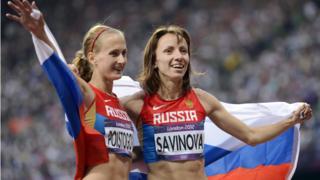 Image copyright
Image copyright
EPA
Accused of doping: Russia’s Mariya Savinova (right) won the Olympic 800m at London 2012 and Ekaterina Poistogova came third
When I used to live in central Moscow quite often I would visit the giant swimming pool built for the 1980 Moscow Olympics.
And as I used to breast-stroke or crawl my way – embarrassingly slowly I have to say – up and down the lane, I would look up and be inspired by three words printed in big letters on the wall: “Bystree – vyshe – silnee!” (Faster – Higher – Stronger!).
Now this, of course, is the Olympic motto. But to me these three clarion calls seemed to sum up the meaning of sport in Russia. It’s about pushing the boundaries, constant improvement and, ultimately, about becoming the best.
Image copyright
AFP
Russia loves sporting success: 2008 Olympic champions (from left) Maxim Opalev (canoeing) and Larisa Ilchenko (open water swimming)
Image copyright
AFP
Russians are familiar with President Putin’s love of judo and ice hockey
Russia has always been a highly competitive country, whether in the days of communism against capitalism, the arms race, the space race or an Olympic relay race.
Shadow of doping
Sadly, today if you hear Russian athletes claiming they’re becoming “Faster – Higher – Stronger” the first thing you think about is doing a doping test. Which is unfair, really, because of course not all Russian sportsmen and women are guilty of taking banned substances.
But there’s no doubt that allegations of a state-sponsored doping programme here have cast a huge shadow over Russian sport.
Image copyright
AFP
Russian football fans (foreground) clashed with England fans in Lille (in photo) and Marseille
But it’s not just doping scandals that have rocked Russia.
Sometimes I think that instead of wearing snazzy suits, Russian Sports Minister Vitaly Mutko should be dressed like a firefighter, in a bright yellow hard hat, a hose in one hand and fire extinguisher in the other. Because recently his job has been all about fighting one fire after another.
For example:
- 2014: German TV says it has evidence of widespread doping in Russian track and field (Boom. Fire!)
- 2015: Russian athletes banned from international competitions (Boom. Another blaze!)
- Last month – yet another inferno as riot police break up a mass brawl at a top Russian wrestling competition
- And just a few days ago, at Euro 2016, Russia is threatened with disqualification over its football hooligans, three of whom are later jailed in France
Image copyright
AFP
The Olympic doping scandal put Russian Sports Minister Vitaly Mutko in the media spotlight
What on earth has gone wrong with Russian sport?
Well, you often hear officials and politicians here claiming that it’s not their fault, that it’s not Russia lighting all these fires – that this is arson by the West, which is exaggerating the problems in Russian sport for political gain.
Moscow maintains that sports doping is a global problem, football hooliganism is a global problem. Don’t dump the blame solely on us, they cry.
But Moscow’s sternest critics say that cheating and violence in sport here is the result of a resurgent and belligerent Russia which seeks victories on all fronts and at all costs.
Whatever the reason, Russia’s reputation is suffering. It reminds me rather of how I used to feel as I spluttered my way across the Olympic swimming pool – in other words, there’s a bit of a sinking feeling about Russian sport.



